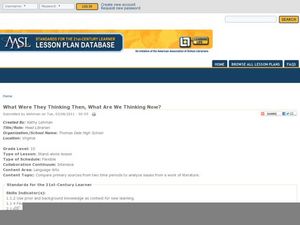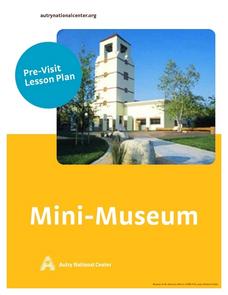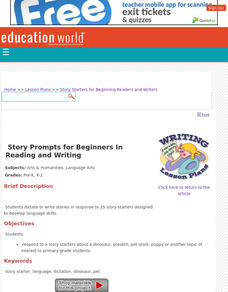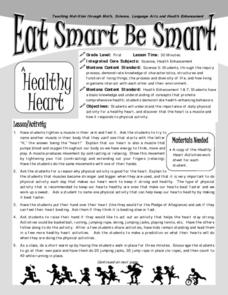Alabama Department of Archives and History
Working in Birmingham's Iron Industry
What did railroads, iron, and industry contributed to Birmingham's successful growth? The lesson explains how the iron industry worked. It also describes how the location of Birmingham and its proximity to railroads. played a key role in...
EngageNY
End of Unit 3 Assessment: Writing a Research Synthesis
Ready, set, write! Scholars work on the end-of-unit assessment by completing a writing prompt. They then look at the model performance task from instructional activity two to create a rubric for scoring the exercise. Using turn and talk,...
Curated OER
Made from Animals
Here is a terrific lesson for elementary schoolers on products that come from animals. In it, pupils discover that we get a lot more than just food from animals. After a class discussion and teacher-led demonstration, learners utilize...
Oglebay Institute
Post-Impressionism: Pointillism
How can little dots in two colors make a third color? Experiment with pointillism and color mixing with a series of activities. After viewing paintings by Seurat and watching a teacher demonstration, pupils create samples of three...
Curated OER
Mixing Complimentary Colors, Tints, and Shades
Middle schoolers explore primary, secondary, and complimentary colors. They mix tempera paints to create secondary colors, tints, and shades, and design and paint a color grid demonstrating color theory.
Curated OER
Evaluating Books
What are the characteristics of a good research source? At the beginning of a research project, have your class brainstorm evaluative criteria for primary and secondary source material. They then use the generated list to guide their...
Curated OER
What Were They Thinking Then, What Are We Thinking Now?
Choosing an issue from a play or novel, researchers find two primary sources from different time periods to compare how people's views have changed. Many questions are listed to guide young writers. In the end, learners produce a...
Curated OER
Mini Museum
Learners brainstorm about the different types of museums and complete a worksheet by looking at artifacts and what they think that object did. They work together in groups to complete a KWL chart throughout the lesson plan.
Curated OER
Unit of Study Mural
Young scholars make a mural after reading about the art of Diego Rivera. For this mural lesson plan, students read a book about Diego Rivera, discuss him and his artwork, and make their own class mural.
Curated OER
All Aboard
Explore the U.S.S. Nevada. Researchers use primary sources, secondary sources, children's books and websites to study the naval ship. Their study commences with a class alphabet book on the ship. Intended to be part of a lesson on...
Curated OER
Story Starters for Beginning Readers and Writers
Students respond to a story starters about a dinosaur, present, pet store, puppy or another topic of interest to primary-grade students. They dictate or write stories in response to 15 story starters designed to develop language skills.
Curated OER
The Treaty Trail: Examining an Artist's Perspective
Elementary school leanrners examine artwork from the time period of the United States and Native American treaties. They discuss the causes and effects of the treaties being signed. They also examine how cultural perspective influences art.
Curated OER
Colors
Students explore various colors. They research information on the primary and secondary colors. Students research the colors of the rainbow and they create a picture of a rainbow using Kid Pix.
Curated OER
Twain's Hannibal
High schoolers use primary resources to examine the context the writings of Mark Twain. They criticize the resources for reliability, accuracy, perspective, relevancy, and authoritativeness.
Curated OER
"Intelligent Design" and Ohio's Science Curriculum
Students explore the debate between intelligent design and Darwinism. They research both topics by accessing primary sources. Students interview school administrators to determine what its science curriculum is and the timeline for any...
Curated OER
Evaluating Information Quality
Students evaluate information they are given and identify the quality of the information as fact, fiction, and point of view. In this information quality lesson plan, students also discuss how they can pick out good information verses...
Clean Up Australia
Why are Batteries Harmful to the Environment?
Open this lesson by reading together about primary and secondary batteries (such as nickel-cadmium cells), problems they can cause in the environment, and how humans can minimize the damage. Afterward, little ones examine a collection of...
Curated OER
Monet And Impressionism
Students create and discuss works of Impressionism in this lesson plan for the elementary classroom. Emphasis is placed on Monet's "Water Lilies" and the Bridge or Gardens at Giverny.
Curated OER
Vincent's Flowers
Students create original works of "sunflower" art using Van Gogh's paintings and the book "Camille and the Sunflowers" as a basis. Pastels and sugar paper are the suggested medium for this creative project.
Curated OER
1900 America: Historical Voices, Poetic Visions
Students examine the United States at the turn of the century. Using primary source documents, they interpret them within a specific historical context. Using this information, they write a poem with metaphors and a specific meter They...
Curated OER
Connotation in Propaganda
High schoolers assess persuasive techniques in propaganda. They identify and critique rhetorical devices in primary source documents (sources are not specified, but links to sites that contain various documents are included). Groups make...
Curated OER
Color Twist Game
Create your own version of Twister with this step-by-step lesson plan. Materials include canvas, acrylics, poster board, compass, and foam paint brushes. This is a fun art project that will also provide lots of activity and laughs!
Montana Office of Public Instruction
Eat Smart Be Smart
Get children's blood pumping with this primary grade instructional activity on the human heart. After learning about the important role this muscle plays in the human body, students monitor their heart rates and discover the...
Curated OER
California Gold Rush
Students discover the people who lived in California before and after the gold rush. They use primary source documents to identify how the finding of gold changed the area. They also discover the discrimation that was present during the...
Other popular searches
- Art Lessons Primary Penguins
- Edible Art Lessons Primary
- Art Lessons Primary Easter
- 3d Art Lessons Primary
- Art Lessons Primary Fruit
- Winter Art Lessons Primary
- Maori Art Lessons Primary
- Visual Art Lessons Primary
- Art Lessons Primary Tiger
- Art Lessons Primary Water
- Art Lessons Primary Victoria
- Art Lessons Primary Art

























